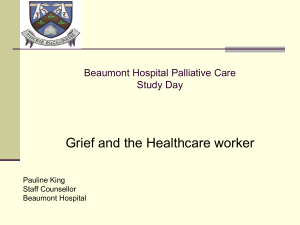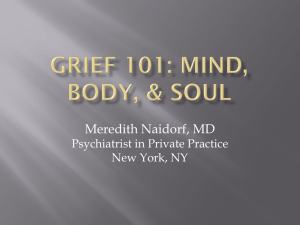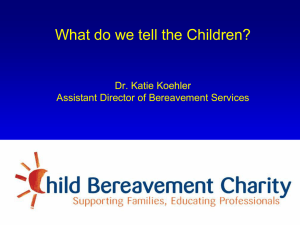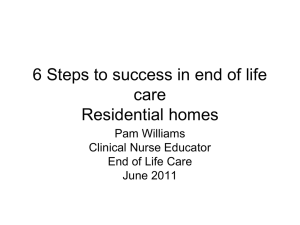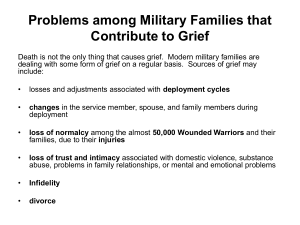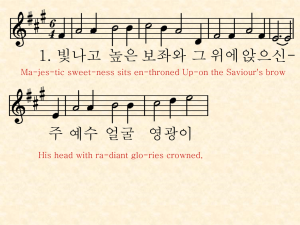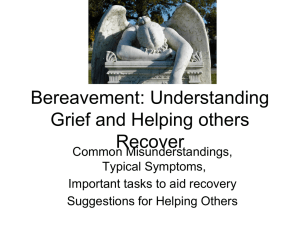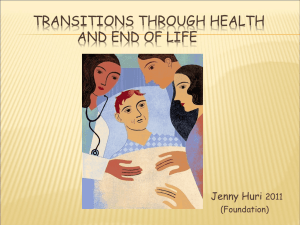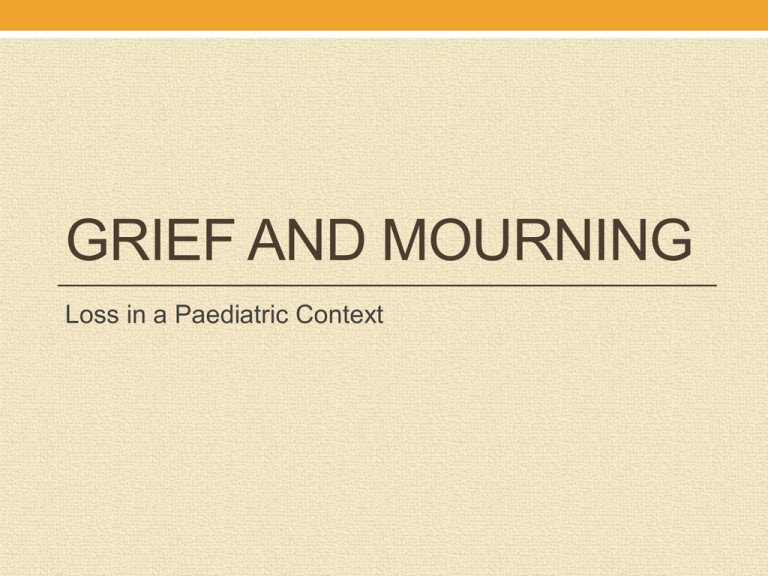
GRIEF AND MOURNING
Loss in a Paediatric Context
Who grieves?
• Parents
• Siblings
• Grandparents
• Significant others
• School and activities friends
• A large community
• Care providers
A Parent’s Loss;
• part of own sense of self
• connection to the future
• unfulfilled expectations & ambitions
• some of own treasured qualities/ abilities
• source of love and acceptance
• sense of power and control over what happens
to them
• social status and contacts
• Celia Hindmarch
“She was my child… and she still is
Don’t keep telling me what you think I am
doing wrong.
I’m doing it my way.
It’s the only way I know how…”
Beyond Words, Skylight, 2012
Anticipatory Grief
• Normal mourning when facing a death
• Can be as intense as grief after the death
• Varies in intensity
• May not occur especially in strong denial
Stages of Anticipatory Grief
1. realise death is eminent- sadness
depression
2. concern for dying child- regrets, anxieties
3. rehearse death-concerns, fears, planning
4. imagine life afterwards; anniversary, stuff,
grieving
Manifestations of Grief
Manifestations of Grief
Emotional
• Shocked, stunned, sad,
desolate, afraid, lonely, let
down, overwhelmed,
helpless, regretful, angry,
guilty, relieved, sense of
injustice, numb, empty,
drained
Physical
• Crying, moaning, agitated,
exhausted, sleeping
changes, central
constriction; dry mouth, tight
chest, stomach ache,
digestive issues, nausea,
nervous laughter, more
illness and accidents,
sensory sensitivity
Skylight2012
Manifestations of Grief
Mental
• Blank, confused, forgetful,
distracted, slow
responses, difficult to
make decisions, replaying,
preoccupation, difficulty
switching off, blaming,
different world view,
overwhelmed; too hard
Social
• Needing to talk over,
avoiding talk, wanting
people or not, difficulty with
commitments, changed
reactions to touch, hurting
others, differing family
relations, risk taking
• Skylight2012
Manifestations of Grief
Spiritual
• Sensing the presence of
the child who has died,
asking why, seeking
beliefs or turning away
from them, praying or
abandoning prayer,
seeking nature, looking for
meaning
• Skylight2012
“Inside this Shell of Mine” Nancy Bright
“Aside
from offers of absorbent products, what do we have to offer
each other? My mother was a pragmatic girl who finally told me a
safe place to grieve was lying on the floor. She said that on the
floor, ‘there’s no place to fall.’ She was right. My body would
collapse from the howling and it would curl itself up on its side on
the wood floor like a salted slug, and the floor would not drop me. I
still feel the smooth wide boards of the kitchen floor against my
cheek; its cool bones against my heated ones.”
THE WHIRLPOOL OF GRIEF
Words of Loss
• Bereavement is what happens to you
• Grief is what you feel
• Mourning is what you do
• Celia Hindmarch
Contexts
• culture
• community
• religion, spirituality
• male/ female
• environment
• concurrent stresses
• history
• society
And then there is Media
Tasks of Grieving
William Worden
• to accept the reality of the
loss
• to work through the to the
pain of grief
• to adjust to an environment in
which the deceased is
missing
• to emotionally relocate the
deceased and move on with
life
Alan Wolfelt
• Acknowledging reality of the
•
•
•
•
•
loss
Embracing the pain of the loss
Remembering the person who
died
Developing a new sense of
identity
Searching for meaning
Receiving ongoing support
from others
Practical Advice for Mourners
• Eat healthy, drink water, rest and sleep and exercise
• Talk to a trusted person, be with good people who care
•
•
•
•
•
•
about you, be by yourself
Ask for what you need, be honest
It’s ok to grieve, cry, not cry, feel what you feel
Talk with people who have been there, don’t cut off
permanently
Listen to music, go to nature, get creative
Have massage, hugs, treats
Keep safe, get help, forgive self, be patient
• Skylight2012
Transition
• A new sense of self
• connecting to the deceased
• inner representation
• identification
• incorporation
• rituals, remembering
• “death is a transition not an illness”
Phyllis Silverman
Reconciliation
• Making friends with grief
• Carrying on without physical presence
• New sense of meaning and purpose
• Hope and commitment to future
• An ongoing journey
Advice
• Allow yourself to mourn
• Watch out for cliches
• Your grief is unique
• Develop a support system
• Allow yourself to feel
• Embrace your treasure of
numb
• This death is out of order
• Expect to feel a multitude
of emotions
• Be tolerant of your limits
• Talk about your grief
memories
• Gather impt keepsakes
• Embrace your spirituality
• Move toward your grief
and heal
• Dr Alan Wolfelt
Risk factors
• who the person was
• nature of attachment
• mode of death
• history
• personality
• social context
• concurrent stresses
Masculine Style
• Quieter, less visible
• Less connected with past, more with future
• Less passive, more aligned with action
• Not as well accepted
“When a woman feels lost, she tends to ask for
help. When a man feels lost, he looks for a map”
Tom Golden
Grandparents
• “a grandparent’s grief is
like a fork with two
tines—one representing
the loss of a grandchild,
the other representing
the pain of your own
child’s suffering.”
• M.H.Gerner-”For Bereaved
Grandparents”
• Listen to your bereaved
child
• Talk about your
grandchild
• Consider your needs
• Survivor guilt & anger
• Hope for a better day
Siblings Charter
We need to respect their
rights to;
• Bereavement Support
• Express feelings and
thoughts
• Remember the person
who has died
• Education & information
• Appropriate and positive
response from school
• Voice in impt decisions
• Everyone involved
• Meeting others
• Established routines
• Not to blame
• Tell their story
• Winston’s Wish 2003
What do Children Understand?
• age
• environment
• experiences
• personality
• family coping
Sara Fleming, NP
Concepts of Death
• Separation (age 5)-dead people do not co-exist
with the living
• Causality (age 6)-death is caused by something,
be it trauma, disease, or old age
• Irreversibility (age 6)-a dead person can not
‘come alive’ again
• Cessation of bodily functions (age 6)
• Universality (age 7)- all living things will die
• Insensitivity (age 8)-the dead can not feel fear
or pain
• RCH website
Sara Fleming, NP
What do Children Understand?
• Environment
• Physical
• Social
• Cultural
• Emotional
Sara Fleming, NP
What do Children Understand?
• Experiences
• Personality
• Life journey
• Responses to stress
• Sex
• Capacity to adapt
• Bonding
Sara Fleming, NP
What do Children Understand?
• Family Coping
• Extent of crisis
• Collective behaviours
• Communication style
• Alliances
• Resources
Sara Fleming, NP
Age
Grief Response
Companioning
Infants and Toddlers
Baby-2 years
• “I’m upset”; cry, thumb suck • Physical comfort
• Change in normal patterns • Accept, get routine
in sleeping, eating, fussing
Loss= absence
Preschoolers
3-6 years
Death may be thought of as
temporary and/or reversible
Grade Schoolers
6-11 years
• May not understand new
feelings, unable to
verbalise
• Ask ? About death over
and over. Reenact death in
play
• Regress- potty, sucking,
baby talk
• Provide terms for
feelings
• Answer concrete &
lovingly. No half truths
• Death play ok, join in
and offer guidance
• These are normal.
Offer presence and
support
• Express grief primarily
through play
• May “hang back” socially,
scholastically
• May act out because they
don’t know how else to
handle their grief
• Use “older kid” play
therapy
• Permit to take time to
mourn, give them time
• Offer venting
alternatives. Support
groups can be helpful.
Alan Wolfelt-Companioning
the Grieving Child
Age
Grief Response
Adolescent
12 years and up
• May protest the loss by acting • Tolerate if no-one is
out/ withdrawing
being harmed.
Withdrawal is normal
short term only.
Understand death
cognitively but are only
beginning to grapple
with it spiritually
Companioning
• May feel life has been unfair
to them, act angry
• Normal egocentrism.
After he has had time to
explore this, encourage
to consider the impact on
his larger social group.
• May act out a search for
meaning, test his own
mortality
• Teens explore the “why”
about life and death.
Encourage search unless
it may harm
Alan Wolfelt-Companioning the
Grieving Child
Sara Fleming, NP
When a sibling dies
Layers of loss
Survivor Feelings
• an ally
• Guilt
• a companion
• a carer, a dependent
• Relief
• an identity
• innocence
• Fear
• routine, normality
• balance
• Confusion
• Wolfelt
Behaviour
• acting out
• withdrawal
• disobedience
• insecurity
• inattention
• sleep disturbance
• appetite changes
• sensitivity, fears
Sara Fleming, NP
What helps?
• Information, answer questions
• involvement, funeral etc
• discussion about loss
• normality, play
• special time,
• meaningful memory making and rituals
• peer and school support
• external support
• working with the parents/carers
Sara Fleming, NP
Memory making and rituals
• Treasure box
• Conversation
• Plant tree, garden
• Ongoing activities
• Christmas decoration
• Anniversary actions
• Drawing
• Special places
• Photo collection
• Mealtimes
• Touchstones
• Sad, mad, glad space
• Poetry, music
• activities
• Star naming
Talking with Children
• our own anxieties, helplessness
• talking to becomes with
• repeat information
• reassurance, trust, security
• right place, right time, right person
• not what you say but how you say it!
Sara Fleming, NP
How you say “it”
• talk at eye level
• speak directly to and with the child
• avoid confusing language and double
meanings
• avoid cliches, platitudes
• keep it short and simple- repeat
• check the child’s understanding
• be truthful & honest- share your feelings
• keep them informed & talk open
- Earl Grollman 1990
Sara Fleming, NP
Carpe Diem
Acknowledge the reality of the
loss
Feel the pain of the loss
Alan Wolfelt
• Talk about the physical reality of
death- may sure they
understand how and why the
person died
• Next time they cry, hold gently
and let then cry as long and
hard and often as they want to
• Invite to share a memory, or ask
Remember the person who died
to show photo of who died then
tell you what was going on when
pic was taken
Carpe Diem
• Develop a new self-identity
Alan Wolfelt
• Ask child to draw 2 pictures; of his
life before and after the death,
talk about differences.
• Search for Meaning
• Receive ongoing support from
caring adults
• Include Child in Funeral
• Share your beliefs without
pressure for child to believe what
you do.
• Create a plan to help, mark dates
to contact and spend time, mark
important dates
• If funeral done, talk about
ceremony answer ?, discuss
ongoing way to honour who died.
Carpe Diem
• Help child choose a keepsake
Alan Wolfelt
• Talk about keepsakes, ask
about a chosen one’s
significance or help plan to
chose/ procure one
• Give permission to find comfort
in linking objects
• Consider child’s relationship to
the person who died
• Do they have one? Talk about
this, affirm need to have and
hold this.
• Think about this from her point
of view. Set aside your thoughts
and feelings and enter her world
as you consider this point.
Schools
• inform of child’s loss
• identify others at risk
• provide simple information with permission
• support staff
• written resources + online
• develop memorial/ritual
• set up liaison with education department supports
Sara Fleming, NP
Others
• Extended Family, friends
• Facebook contacts
• Neighbours
• Community groups
• Sometimes need some help here
Risk Factors
• Nature of the Loss
• traumatic,
• Unexpected
• Features of Child
• Psyche disorder, multiple losses,
adolescent,<5years
• Nature of Relationships
• Ambivalent, low family support, father of teen boy,
mother of young child
• Aranda.S, Milne,D,
Sara Fleming, NP
Sara Fleming, NP
Resources
• NALAG, Grieflink
• Child and Youth Health website
• SIDS and Kids, SANDS
• RCH Palliative Care website
• Compassionate Friends
• Skylight, NZ
• Starbear (S.A.), Anglicare Loss and Grief Centre
• Journeys folder- PallCareAus website
• Disease base associations
9/04/2015
Books
Sara Fleming, CYWHS
Questions
If ever there is tomorrow
when we’re not together…
There is something you must
always remember.
You are braver than you believe,
stronger than you seem,
and smarter than you think,
but the most important thing is,
even if we are apart…
I’ll always be with you.
A.A.Milne

